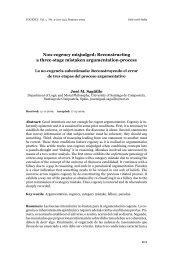Cogency v2 n2
Cogency v2 n2
Cogency v2 n2
You also want an ePaper? Increase the reach of your titles
YUMPU automatically turns print PDFs into web optimized ePapers that Google loves.
Editorial: Ludwig Wittgenstein… again and again / C. SANTIBÁÑEZ YÁÑEZ<br />
did, then it is fair to ask how others might have influenced Wittgenstein.<br />
For instance, I always have been surprised by the huge similarity between<br />
Fritz Mauthner and Wittgenstein. Mauthner was a very famous intellectual<br />
in Vienna when Wittgenstein was a child, a friend of his father and obliged<br />
reading at home. The idea that “language is its use”, the image of the stair as<br />
a metaphor for language, and even the idea of the language game–the idea<br />
that language is an activity though which we learn the analysis of some verbs,<br />
“understand” for example, through context and usage and not through definitions<br />
or “essential meanings”–all these ideas were already coined by<br />
Mauthner before Wittgenstein made them famous. Wittgenstein, in fact,<br />
mentions Mauthner obliquely in § 4.0031 of the Tractatus.<br />
Another influence on Wittgenstein, at least potentially, was F.P. Ramsey.<br />
Koethe (1996) speculates that the only figure “who might have pushed him<br />
to attempt a clearer and more explicit formulation of the philosophical<br />
themes that inform his later writings” (p.165) was Ramsey. Koethe supports<br />
this notion by continuously quoting others, “In his introduction to Ramsey’s<br />
Philosophical Papers, D. H. Mellor suggests that Ramsey’s untimely death<br />
had a deleterious effect on the development of philosophy at Cambridge, as<br />
well as on Wittgenstein’s philosophical development… Ramsey may have<br />
been the one philosopher at Cambridge who not only was Wittgenstein’s<br />
intellectual peer but also possessed the ability and inclination to engage him<br />
in a sympathetic and yet critical way.” (p. 165). It was Ramsey who was<br />
actively involved in the first translation of the Tractatus from German into<br />
English, at the age of 18. 6 Although Wittgenstein went to Cambridge to learn<br />
from Russell, he rapidly distanced himself from him not long after.<br />
Wittgenstein’s ideas were thus developed in the context of an ongoing conversation<br />
with his colleagues and peers–precisely the kind of conversation<br />
studied by argumentation theorists. But what of his influence on argumentation<br />
theory itself?<br />
In the studies of argumentation theory, Toulmin is regularly mentioned<br />
as one of those influenced by Wittgenstein. Certainly Wittgenstein’s influence<br />
is felt in Toulmin’s The Uses of Argument, a text familiar to nearly all<br />
argumentation scholars. It is also felt, however, in Toulmin’s first book, his<br />
doctoral dissertation, An Examination of the Place of Reason in Ethics,<br />
6<br />
In Culture and Value, §89, Wittgenstein nevertheless is very acid towards Ramsey.<br />
11








